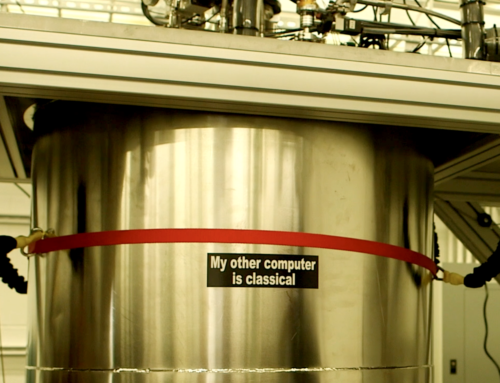Image via GCN
Part I of III
Gabriella Skoff
The game-changing role that quantum computing is set to play in machine learning is a topic of conversation shrouded in much hype. Theoretically, quantum computing could increase algorithmic capacity to crunch large datasets, enhancing the performance of deep learning and accelerating the progress of artificial intelligence (AI) much more quickly than what is currently possible using conventional computers. While scientists have theorized that the power of machine learning could be exponentially enhanced by quantum computing, it has generally been believed that current quantum technology has not yet reached the level of maturity needed to lend this essential boost. New research, however, presented by a joint team of researchers from IBM Research, MIT and Oxford offers some experimental proof to back this theory.
The recent study published in Nature, entitled “Supervised learning with quantum enhanced feature spaces”, demonstrates that currently available quantum computers can enhance a certain type of machine learning known as feature-mapping. While the researchers acknowledge that we still have far to go before we achieve quantum advantage for machine learning, they have high hopes that the feature-mapping method could ultimately enable computation of far more complex data sets than currently possible. This news indicates that perhaps quantum and AI will collide much sooner than expected.
According to Dr. Jerry Chow, Manager of Experimental Quantum Computing at IBM: “[The researcher’s] approach to quantum machine learning provides us with a path to understanding in which way even noisy, intermediate-scale quantum computers can outperform classical machine learning algorithms”. The team of researchers were able to achieve nearly perfect classification of their input data using a two-bit quantum computing system. These results suggest that quantum computing is likely to have a major impact on machine learning, improving the performance of machine learning to a speed and efficacy on a scale much larger than ever before, sooner rather than later.
Still, reaching a fully conscious AI is a far-off goal, if it can ever be achieved, and fully functional quantum computers may not sit just around the corner either. Regardless, researchers hope that quantum computing will speed up the process and help us to create better AI, faster. At the same time, AI is well-suited to assist in the development of quantum systems. It can play a critical role in helping scientists to make sense of the vast amounts of data it can produce by identifying patterns and creating systems to understand it at a rate far faster and more efficient than human beings are capable of.
As indicated by the aforementioned research and by the quantum-community at large, the quantum-AI horizon draws ever nearer. Within this context, it is essential to explore how this fusion of two of the world’s most powerful technologies will impact our lives, as it surely will. This discussion, not only confined to the topic of quantum and AI but to all emerging technologies, is characterized by a tendency toward polar extremes. The resulting debate is often charged either with fear-based language or by exaggerated promise and hype. This investigation seeks to explore the space in between, in hopes of promoting a more measured and nuanced approach to discussing both the promises and perils of the quantum-AI nexus.
Quantum computers remain a bit of a unicorn concept to many, an elusive idea we hear much about but understand little of. While many have heard that quantum computing should positively impact a number of sectors through, for example, drug discovery, climate forecasting and financial modelling, most of us would not know how to describe what a quantum computer even looks like. The reality is that this will not change for a long time. The conditions needed for the functioning of a quantum computer, including a lack of environmental noise interference and a perfect zero-degree temperature, requires the highly controlled environment of a laboratory setting. As such, quantum computers will not replace personal computers any time soon. However, the impact they will have and in fact are already having even before quantum supremacy has been reached, will affect us in many ways.
AI, on the other hand, is something that most of us already interact with on a daily basis. Many understand that the capabilities of AI are only as good as the amount and quality of data an algorithm can crunch. Companies like Google have been feeding algorithms mass amounts of data for the last couple of years in an effort to boost its capacity to form “real” human interactions. Did you think that the predictive text function on Gmail was only introduced to help you write emails more quickly? Think again. And Google is far from alone in this practice. Most companies and even many governments collect our data, which in most cases we consent to giving them. Society has grown comfortable with this thoroughly proliferating phenomenon, believing that the information captured will be applied to harmless ends, such as improving the user experience. While this is partly true, it is important to understand that the trajectory of most technologies is not contained within their declared use-value.
For this reason, we seek to explore the scope of quantum-AI fusion from a social impact perspective. The path to reach this destination as well as our resultant arrival, presents a host of ethical challenges to confront. At the same time, these technologies promise to revolutionize a diverse array of systems and practices across a broad range of disciplines that could make this world a better and fairer place for many. The following segments will explore some of the possible positive and also the potential negative impacts that the merging of quantum and AI could unleash. In doing so, we hope that the entire spectrum of these emerging technology’s social impact will be considered. With the understanding that in order for the peaks of advancement and positive impact to be reached, the troughs too must be thoroughly investigated, we present an exploration of where we could channel and regulate these technologies in order to boost the positive and diminish the negative impacts they will produce.
Join us next week as we publish the first follow-up in this series on the promises of quantum-AI.







[…] Image via GCN Part I of III Gabriella Skoff The game-changing role that quantum computing is set to play in machine learning is a topic of conversation shrouded in much hype. Theoretically, quantum computing could increase algorithmic capacity to crunch large datasets, enhancing the performance of deep learning and accelerating the progress of artificial intelligence… — Read on projectqsydney.com/2019/04/24/when-quantum-meets-ai-the-promises-and-perils-of-a-fusion-between-the-… […]